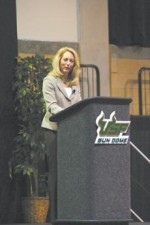Spy shaken, not stirred by Bush admin.

Valerie Plame Wilson, an outed spy and staunch critic of the Iraq war, visited the Sun Dome on Tuesday night to share her experiences as a CIA operative who was thrust into the national spotlight unexpectedly.
“My name is Valerie Plame Wilson and I have a story to tell you,” began Wilson. “I am delighted, after everyone speaking about and for me, that I finally get to tell my story.”
After discussing her training, Wilson described the climate in America after Sept. 11 as negative.
“The (events of 9-11) created a shadow of fear that has loomed over America ever since,” she said.
Wilson accused former Secretary of Defense Donald Rumsfeld of “already having a target map of Iraq on the tables of Camp David” in the days that followed the Sept. 11 attacks. “The switch from Afghanistan to Iraq was made before we even knew it.”
The justification for the Bush administration’s Iraq invasion was that there were weapons of mass destruction being stockpiled by Saddam Hussein, that had been connected to or somehow purchased from Africa, she said. In George W. Bush’s January 2003 State of the Union address, Bush claimed that Saddam Hussein had sought significant quantities of uranium from Africa.
However, after Joseph Wilson, Valeria Plam Wilson’s husban, traveled to Niger, a country noted for mining and producing the type of uranium used in nuclear reactors and weapons, he reported that he had not found information that confirmed an Iraqi presence in Niger’s uranium market. Mrs. Wilson was aware of her husband’s trip and had seen his reports after they were disseminated through the ranks of the CIA.
When former Secretary of State Colin Powell spoke just five days after the 2003 State of the Union, Wilson said her heart sank.
Wilson said she knew that uranium had not been purchased through Niger and that Powell’s source, known as “Curveball,” was not respected in the intelligence community because of an ongoing drinking problem, compromising the information he presented.
Mr. Wilson wrote a column in the New York Times explaining his mission to Niger and what he found.
What followed was the outing of Mrs. Wilson and a maelstrom of legal and media attention that became known as the Lewis “Scooter” Libby trial.
Mrs. Wilson wrote a book about her experience to set the record straight and to emotionally process her own story. “We’d been living it at 120 miles per hour and I needed to sort it all out,” she said.
Any book that a current or former CIA employee writes must go through the Publication Review Board, which approves or denies its publishing, and denotes what can or cannot be printed within the context of the book. The only comments that were initially made by the reviewer were that the amount of time she worked for the agency was different from the CIA’s official position.
“I felt like a non-person, like my history had been erased,” she said.
The CIA chose to redact whole pages from Wilson’s book that she claims would not have in any way interfered with the agency’s operation and that the redactions are actually a violation of her First Amendment rights.
Wilson urged those interested in a career in public service to pursue it, even with the CIA. “I’m not here to criticize the whole of the CIA, just to tell you that you can’t be afraid to stand up for what you know is right,” Wilson said, closing her speech with a quote from Thomas Jefferson.
“When a citizen fears their government, that’s tyranny,” she said. “When a government fears its citizens, that’s democracy.”






